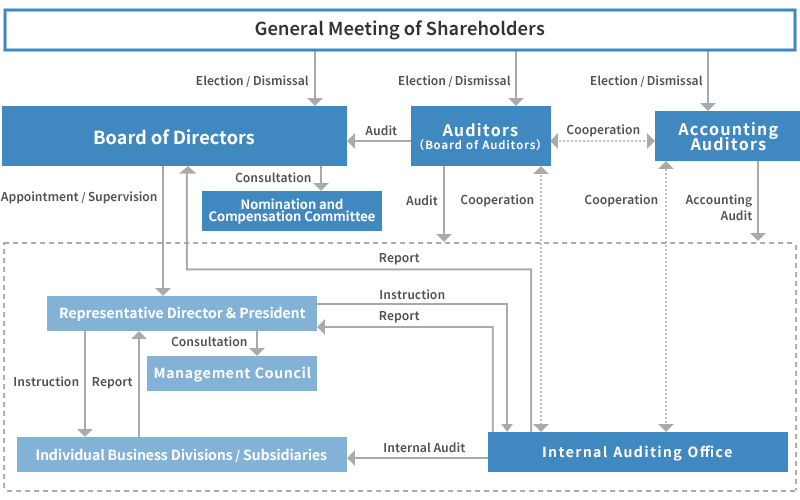- HOME/
- HOME/
- INVESTOR RELATIONS/
- Top Message/
- Corporate Governance
Management PolicyCorporate Governance
Basic Approach to Corporate Governance
The Company strives to establish and maintain an excellent relationship with our stakeholders, which are our shareholders, customers, business partners, the local community and our employees, and to achieve stable long-term growth through maximizing our corporate value. At the same time, we believe that achieving and maintaining sound management is also one of the most important issues of our management. Based on this recognition, we have a number of policies designed to enhance our corporate governance.
Company Structure
-
-
1. Directors and Board of Directors
-
The Company has 10 Directors and 4 of whom are Outside Directors, to strengthen the monitoring functions of the Board of Directors. The Board of Directors decides on important matters relating to the conduct of business and supervises the performance of duties by Directors. The Board of Directors ‘Meetings are held on a regular monthly basis and extraordinary as needed. In addition, the Company conducts analysis and evaluation of the effectiveness of Board of Directors’ Meetings and discuss the way to enhance the effectiveness and to improve the function for Board of Directors’ Meetings.
-
-
-
2. The Management Council
- The Company has a Management Council that meets to deliberate on matters to be submitted on the Board of Directors and to discuss and decide on important proposals, as an advisory body to the President. The Management Council’s meetings are held on a regular monthly basis and extraordinary as needed.
-
-
-
3. Auditors and Board of Auditors
-
The Company adopts a system of audit and supervisory board with 3 Auditors, 2 of whom are Outside Auditors, to strengthen the monitoring functions and ensure the soundness of management. The Board of Auditors meets regularly on monthly basis and extraordinary as needed. The Auditors attend the Board of Directors’ Meetings, and, in addition, the full-time Auditor attends the meeting of the Management Council. Each of the Company’s Auditors reviews and audit all aspects of the performance of each Director’s duties, recognizing that it is an independent body that takes part in corporate governance.
-
-
-
4. Nomination and Compensation Committee
- The Company has established a voluntary Nomination and Compensation Committee, chaired by an independent Outside Director and the majority of whose members are independent Outside Directors, as an advisory body to the Board of Directors. The Committee deliberates on policies related to the nomination of Directors and their compensation, thereby enhancing transparency and objectivity in the nomination and compensation of the Directors.
-
-
-
5. Accounting Auditors
- The Company has appointed PricewaterhouseCoopers Japan, an auditing company, to conduct our accounting audit. PricewaterhouseCoopers Japan provides us with opinions on financial statements, etc. from the perspective of an independent auditor. PricewaterhouseCoopers Japan reports the details of the audit to our Auditors upon completion of the accounting audit and closely cooperates with us in exchanging information and opinions.
-
-
-
6. Internal Auditing
-
The Company’s internal auditing system is supervised by the Internal Auditing Office.
Based on the internal auditing regulation, the Internal Auditing Office, under the direct supervision of the President, audits each division and major subsidiaries in accordance with the annual internal audit implementation plan approved by the President, whether the business is being conducted legally and properly in accordance with the laws, the Articles of Incorporation and internal regulation, and reports the audit results to the President and Auditors.
-
-
-
7. Compliance Committee
- In accordance with the “Compliance Organization and Procedures Regulations”, the Company has appointed a Chief Compliance Officer (CCO), who is responsible for the overall compliance matters of the Company, and has also appointed Compliance Officers (General Managers of each division) in each division. If an Officer or an employee becomes aware of a compliance concern, he or she should report or consult directly with the CCO, as well as with the Compliance Officers of his or her division or another division. In addition, the Company has established a hotline for Officers and employees to report compliance concerns or to consult with outside lawyers. We also provide Officers and employees with training programs designed to increase their understanding and awareness of compliance issues.
-
-
-
8. Information Security Committee
-
The Company has established an Information Security Committee headed by a Chief Information Security Officer (CISO) to manage information security activities.
As a basic measure for information security, the Company takes various measures to maintain, as necessary, the management structure of personal information in accordance with the Law on the Protection of Personal Information, as well as to strengthen and review the rules for training and auditing, mainly based on the existing Basic Rules on Information Security. In parallel with these measures, we emphasize education and training for our Officers and employees.
-
-
-
9. Crisis Management Committee
- The Company has established "Regulations Concerning Risk Management System" to avoid, reduce, and take other necessary measures against various risks in its business operations. In accordance with the same regulations, the Company has established the Risk Management Committee as a deliberative body for risk response. The Committee evaluates and monitors risks and reports to the Board of Directors as appropriate.
-
Corporate Governance System


